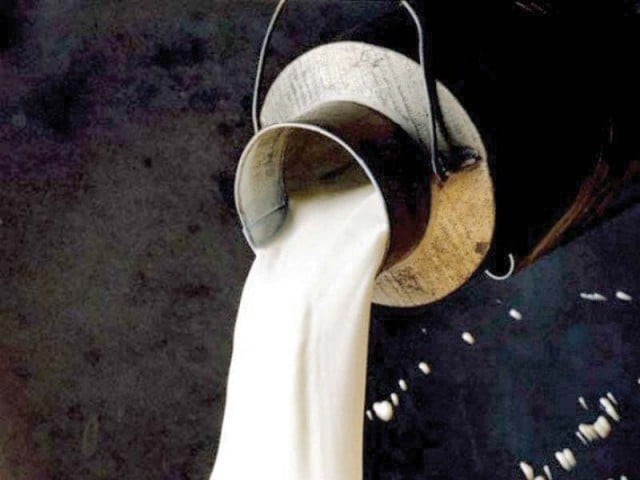Milk supplies slow down
Livestock displacement, fodder shortage result in 20-30% reduced supplies

Currently, Pakistan is experiencing a shortage of loose milk because of the impact of climate change on the agricultural landscape.
The climate change disaster in the country has led to the shortage of one of the essential foods that is milk.
“More than 500,000 livestock are displaced or dead,” Pakistan Dairy Association (PDA) CEO Shehzad Amin told The Express Tribune. In addition, more than 150,000 milking animals are also displaced, he said.
“Out of the animals which are alive, there is a fear of disease outbreak. Crucially, agricultural land has been wiped off, resulting in lack of fodder for the animals. As a result, we are witnessing a shortage of about 20-30% in milk supplies from farms,” he explained.
“Most parts of Sindh and southern Punjab have been submerged under water just days before the start of the wheat planting season. Rehabilitation efforts are underway but the water is taking some time to drain,” he added.
“Primary agricultural infrastructure and inputs of farmers such as tube wells, storages, seed stocks, fertiliser inventory, various agriculture machinery and equipment have all faced damages. These losses would result in reduced farmer income and it will take months to restore the infrastructure,” Shehzad Amin lamented.
According to agri-experts, boundaries between farms have also vanished and will need to be redrawn. It is expected that some land will likely have lost its topsoil, making planting impossible in the upcoming season.
“There is a huge shortage of milk due to floods and the Karachi dairy industry is completely disturbed due to the shortage of fodder for animals,” noted Dairy Farmers Association Karachi General Secretary Shaukat Mukhtar.
“The country faces a food and livestock catastrophe as a third of the land is still under water. Authorities are assessing the damage to livestock due to the recent flash floods,” said JS Global agriculture sector analyst Waqas Ghani Kukaswadia.
“While the latest estimates by the National Disaster Management Authority (NDMA) suggest a loss of 0.75 million animals, we believe there is a possibility that the actual number could be more than double this estimate,” he added.
“This will obviously exacerbate the food situation, thus impacting millions of people and we will likely see an increase in the price of dairy items, especially milk and eggs,” he observed.
“PDA requests for support and seeks exemption from forex restrictions on the import of dairy food inputs, which remains essential food items,” said Shehzad Amin.
Published in The Express Tribune, September 11th, 2022.
Like Business on Facebook, follow @TribuneBiz on Twitter to stay informed and join in the conversation.


















COMMENTS
Comments are moderated and generally will be posted if they are on-topic and not abusive.
For more information, please see our Comments FAQ